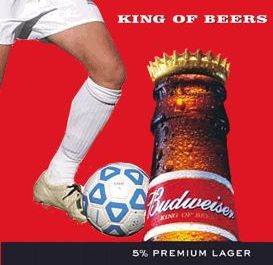 |

|
|

|
|
|
 |

home
about
features
A-Z
books

|

|

Protz:
features
reviews
tastings
|

| |
World Cup beer? I think not...
by Willard Clarke, 08/06
We all remember the summer of football fever as the World Cup dominated our screens, and a cry (in many languages) was heard around the globe: "Get the beers in!"
I remember at the time I was asked on BBC Radio 5 Live which beer I would be supping as I followed the fortunes of the England team. I said that as Bitburger, a major German brewer, is in dispute with Anheuser-Busch, producer of
Budweiser, I would probably lay in a crate or two of the German beer as my own personal two-fingered salute.
But there is little doubt that many football fans were drinking Budweiser. After all, it was the official beer of the 2006 World Cup. The fact that its name was emblazoned on our TV screens encouraged drinkers to buy
heavily discounted boxes of the stuff from their supermarkets.
On the radio show I asked the purely rhetorical question: "Why is an American brew the official beer of the tournament?" The answer, of course, is the all-mighty power of the dollar. The United States did
have a team in the cup - they beat the one-legged blind players from the Pacific island of Diego Maradona in a qualifying round - but the country is a marginal force in world football.
|
|

|
If FIFA, the governing body of world football, had a shred of honesty, decency and morality in its collective makeup it would have looked for a different brewery to sponsor the cup. It is deeply insulting to the
Germans, who belong to one of the world's great brewing nations, to scream the word "Budweiser" at them for several weeks when no self-respecting drinkers in that country would allow a single drop of the
beer to moisten their lips.
An ancient law dating from 1516 called the Reinheitsgebot or Purity Law governs the way beer is made in Germany. This stipulates that only malted barley or wheat, hops, yeast and water can be used.
No cheap cereals or chemical pit-props can be added. American Budweiser does not meet the demands of the Purity Law. On its cans and bottles, it lists rice before barley as the main cereal used. It's hard to
believe, but it's worth repeating, that Anheuser-Busch makes a virtue of the fact that one of the main ingredients used in its beer is a grain devoid of flavour.
Aroma and flavour could come from another source: hops. The plant not only gives bitterness to beer but also adds delightful characteristics of pine, resins and citrus fruits. But A-B is parsimonious in the
extreme in the amount of hops it uses in its beer.
The bitterness of beer is measured on a scale of International Bitterness Units. Bitburger has 38 IBUs. Another German beer, Jever, has a remarkable 44 units. The Czech Budweiser Budvar is only a
moderately hoppy beer, with 22 IBUs.
American Budweiser has between 10 and 12 IBUs. The level of hops used is so low that the bitterness units scarcely trouble the brewing version of the Richter Scale.

|
|
And yet it was this beer, largely devoid of taste, flavour, malt or hops, that was chosen by the greedy people who run world football to be the official beer of the tournament - even when
taking place in a country that was the first to develop the art of lagering or cold maturation of beer in the 19th century. Today such German lager beers as Augustiner, Bitburger, Jever, Lowenbrau, Spaten,
Warsteiner and many more remain benchmarks of the style.
American Budweiser is not in the same league. Its heavily hyped presence in Germany has already raised a storm. As Budweiser Budvar has registered its brand name there, the American beer can only be sold as
"Bud". This has upset Bitburger, which is known throughout Germany simply as "Bit". Bitburger says Bud and Bit will cause confusion.
|
There's no possible confusion when you drink the two beers. I cheered on our lads over the summer (to no avail) but did so with some Bitburger by my side.
And just to prove how even-handed I am, I also had some Budweiser as well. The Czech version, of course.
|
|
home
about
features
A-Z
books
|

